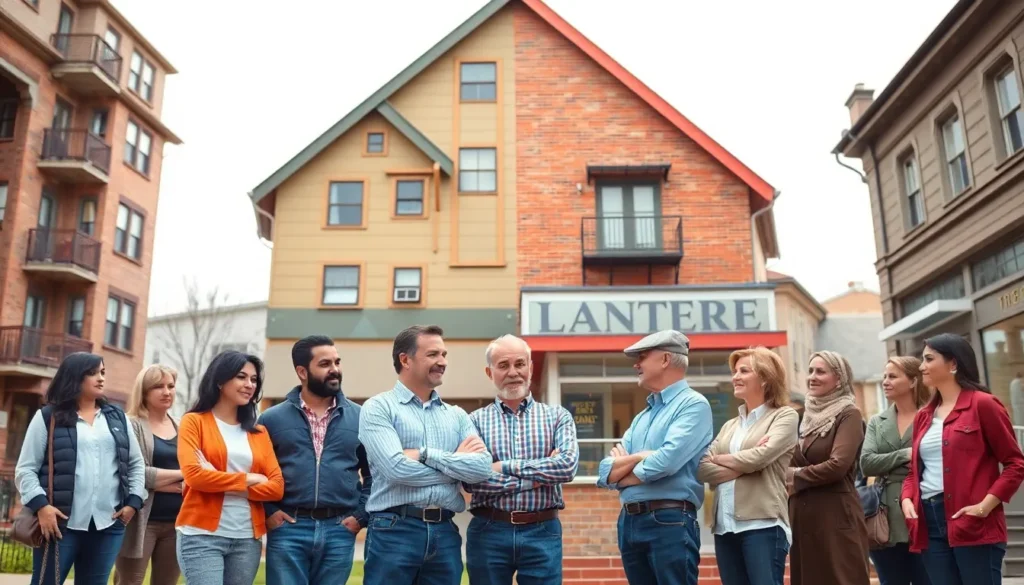Navigating the world of property rental permits can feel like trying to solve a Rubik’s Cube blindfolded. With rules and regulations that change faster than a cat video goes viral, it’s no wonder landlords often find themselves scratching their heads. But fear not! Understanding these permits is the key to unlocking a successful rental venture.
Table of Contents
ToggleOverview of Property Rental Permits
Property rental permits represent a vital aspect of the rental process. Understanding these permits helps navigate regulations and ensures compliance in the rental market.
Definition and Purpose
Property rental permits serve as official approvals from local governments. Landlords obtain these permits before renting out residential or commercial properties. The permits verify adherence to zoning laws, health codes, and safety regulations. They aim to protect both landlords and tenants while maintaining property standards in communities. Without these permits, landlords may face fines, legal action, or the inability to lease properties.
Importance for Landlords and Tenants
Landlords benefit from property rental permits as they legitimize their rental operations. They provide a clear framework for lawful business practices. Compliance with local laws can also enhance property value and marketability. Tenants gain reassurance when renting from permitted properties due to regulated safety measures and standards. Protection from unsafe living conditions occurs when permits are in place. Both parties experience fewer disputes when agreements align with the legal framework established by these permits.
Types of Property Rental Permits

Property rental permits primarily fall into two categories. Understanding these categories helps landlords navigate the regulatory landscape effectively.
Residential vs. Commercial Permits
Residential permits apply to properties used for living purposes, such as single-family homes and multi-family buildings. These permits ensure compliance with housing standards, safety regulations, and zoning laws. On the other hand, commercial permits are necessary for properties utilized for business activities, including retail spaces and office buildings. Such permits address different requirements, including business licensing and compliance with health codes relevant to public operations.
Temporary vs. Permanent Permits
Temporary permits are issued for short-term rental activities, allowing landlords to rent properties for limited durations, typically under 30 days. Examples include vacation rentals where compliance with specific local regulations is essential. In contrast, permanent permits cater to long-term rental scenarios, facilitating ongoing leasing agreements without time constraints. Permanent permits require adherence to more comprehensive ongoing regulations to ensure sustained compliance throughout the rental period.
Application Process for Property Rental Permits
Securing property rental permits involves a structured process that varies by location. Following the right steps ensures compliance and facilitates a smoother application.
Steps to Apply
- Identify permit requirements based on local regulations.
- Complete an application form, available from the local government website.
- Pay the associated application fee to initiate processing.
- Submit the application and supporting documents to the appropriate authority.
- Await approval, which may involve an inspection of the property.
- Receive the permit, which allows legal operation as a rental property.
Required Documentation
Documentation requirements can differ significantly. Commonly needed items include proof of property ownership, a valid identification ID of the applicant, and photographs showcasing the property’s condition. Zoning compliance documents ensure the property fits within local zoning laws. Health and safety inspections may also be necessary, demonstrating adherence to local ordinances. Finally, a description of the rental unit’s features further supports the application process.
Challenges in Obtaining Property Rental Permits
Navigating the process of obtaining property rental permits involves several challenges that landlords often encounter.
Common Hurdles
Landlords face a range of common hurdles when applying for property rental permits. Delays in processing applications frequently occur due to insufficient documentation. Complicated zoning laws can create confusion, leading to incorrect submissions. High fees associated with the application process often deter landlords from proceeding, especially those with limited budgets. The necessity for property inspections may introduce additional delays, as scheduling conflicts arise. Landlords may also experience difficulty in understanding specific local requirements, causing frustration. Ensuring awareness of these hurdles aids landlords in preparing adequately for the application journey.
Regulatory Variations by Location
Every jurisdiction imposes different regulatory requirements that impact property rental permits. Local governments frequently maintain unique zoning laws, necessitating thorough research by landlords. Varying application fees can affect overall costs, which landlords should account for. Property types may dictate permit requirements; some regions have strict regulations for short-term rentals, while others are more lenient. Safety and health codes differ, emphasizing the importance of compliance in securing permits. Understanding these regulatory variations empowers landlords to navigate the complexities of each area’s permitting process effectively.
Navigating the world of property rental permits can seem daunting but is vital for any landlord aiming for success. By understanding the different types of permits and the application process, landlords can mitigate potential challenges and ensure compliance with local regulations. This knowledge not only legitimizes their rental operations but also enhances property value and fosters trust with tenants. As regulations continue to evolve, staying informed and proactive will empower landlords to thrive in the competitive rental market. Embracing the permitting process is a crucial step toward building a reputable and sustainable rental business.






